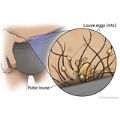Our Health Library information does not replace the advice of a doctor. Please be advised that this information is made available to assist our patients to learn more about their health. Our providers may not see and/or treat all topics found herein. Pubic lice are tiny insects that can live in your pubic area. Sometimes they're found on facial hair, eyelashes, eyebrows, armpits, chest hair, and the scalp. But they're different than head lice or body lice. Pubic lice are often called "crabs" because they look like tiny crabs. Pubic lice eggs (nits) look like tiny yellow or white dots attached to pubic hair, close to the skin. They may be easier to see than live lice. Nits can look like dandruff. But you can't brush them away. Millions of people get pubic lice every year. It doesn't mean you're not clean. Pubic lice are usually spread through sexual contact. But sometimes they can spread through shared clothes, bedding, or towels. Pubic lice can't live long away from a human body. And they can't live on smooth surfaces. Pubic lice can be uncomfortable, but they're not dangerous. Pubic lice usually cause itching around the genitals, anus, armpits, eyelashes, or other body parts with hair. But not everyone has itching. The bites from the lice can cause small, flat marks on your torso, thighs, or upper arms. These marks can look like bruises. They can last for several months, even after the lice have been killed. If you have lice in your eyelashes, your eyes can get crusty or irritated. Pubic lice won't go away without treatment. There are several over-the-counter medicines that kill pubic lice. Most of them are creams or shampoos. There are also prescription medicines. Each type of medicine is a little different, so it's important to follow the directions carefully. Your doctor or pharmacist can answer any questions you may have. If the lice are in your eyelashes, talk to your doctor about how to treat it. You may need to repeat treatment if you still have live lice after the first treatment. Current as of: October 3, 2025 Author: Ignite Healthwise, LLC Staff Current as of: October 3, 2025 Author: Ignite Healthwise, LLC Staff Clinical Review Board This information does not replace the advice of a doctor. Ignite Healthwise, LLC disclaims any warranty or liability for your use of this information. Your use of this information means that you agree to the Terms of Use and Privacy Policy. Learn how we develop our content. To learn more about Ignite Healthwise, LLC, visit webmdignite.com. © 2024-2025 Ignite Healthwise, LLC.Topic Contents
Pubic Lice
Condition Basics
What are pubic lice?
What are the symptoms?
How are pubic lice treated?
How can you care for yourself at home?
How can you help prevent pubic lice?
Related Information
Credits
Clinical Review Board
All Ignite Healthwise, LLC education is reviewed by a team that includes physicians, nurses, advanced practitioners, registered dieticians, and other healthcare professionals.
All Ignite Healthwise, LLC education is reviewed by a team that includes physicians, nurses, advanced practitioners, registered dieticians, and other healthcare professionals.
Our Health Library information does not replace the advice of a doctor. Please be advised that this information is made available to assist our patients to learn more about their health. Our providers may not see and/or treat all topics found herein. Current as of: October 3, 2025 Author: Ignite Healthwise, LLC Staff Clinical Review BoardPubic Lice
All Ignite Healthwise, LLC education is reviewed by a team that includes physicians, nurses, advanced practitioners, registered dieticians, and other healthcare professionals.




